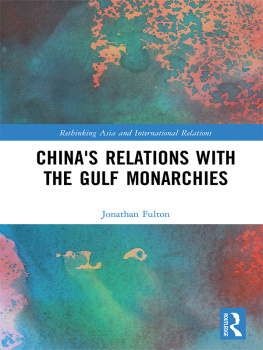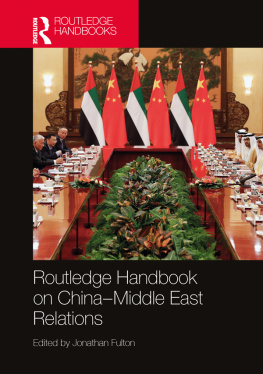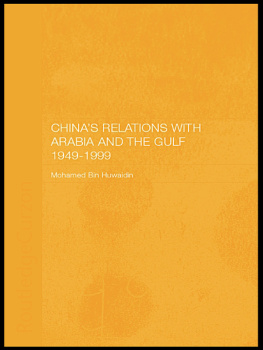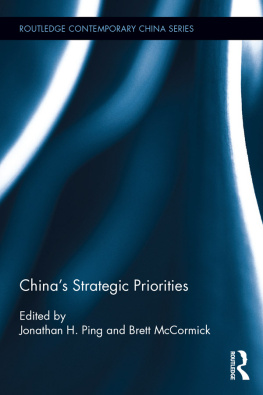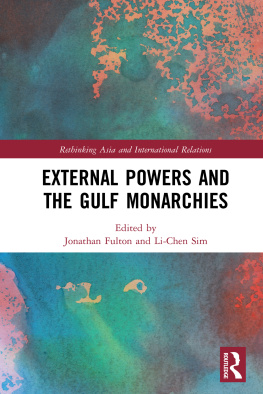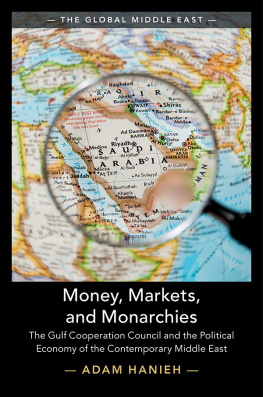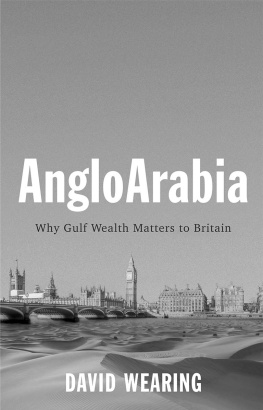Chinas Relations with the Gulf Monarchies
As Chinas international political role grows, its relations with states outside of its traditional sphere of interests is evolving. This is certainly the case of the Gulf monarchies of Bahrain, Kuwait, Oman, Qatar, Saudi Arabia, and the United Arab Emirates, which together comprise the Gulf Cooperation Council (GCC). Chinas level of interdependence with these states has increased dramatically in recent years, spanning a wide range of interests. What motivating factors explain the Chinese leaderships decision to forge closer ties to the GCC? Why have GCC leaders developed closer ties to China, and what kind of role can China be expected to play in the region as levels of interdependence intensify?
Using neoclassical realism to analyse the evolution of Sino-GCC relations, this book examines the pressures that shaped Chinas policy toward the Gulf monarchies and demonstrates that systemic considerations have been predominant since 1949, yet domestic political considerations were also always an important consideration. Relations are examined across diplomatic and political interactions, trade and investment, infrastructure and construction projects, people-to-people exchanges, and military and security cooperation.
This book will appeal to scholars in the fields of International Relations and International Political Economy, as well as area specialists on China, the Gulf region, the Gulf Monarchies, and those working on foreign policy issues.
Jonathan Fulton is an Assistant Professor of Political Science in the College of Humanities and Social Sciences at Zayed University, in Abu Dhabi, United Arab Emirates, where he researches China-Middle East relations, Chinese foreign policy, the global strategic implications of the Belt and Road Initiative, and international relations of the Gulf region. He has written several articles and chapters on China-Gulf relations and is co-editor of External Powers and the Gulf Monarchies (Routledge, 2019).
Rethinking Asia and International Relations
Series Editor Emilian Kavalski, Australian Catholic University (Sydney)
This series seeks to provide thoughtful consideration both of the growing prominence of Asian actors on the global stage and the changes in the study and practice of world affairs that they provoke. It intends to offer a comprehensive parallel assessment of the full spectrum of Asian states, organisations, and regions and their impact on the dynamics of global politics.
The series seeks to encourage conversation on:
what rules, norms, and strategic cultures are likely to dominate international life in the 'Asian Century';
how will global problems be reframed and addressed by a 'rising Asia';
which institutions, actors, and states are likely to provide leadership during such 'shifts to the East';
whether there is something distinctly 'Asian' about the emerging patterns of global politics.
Such comprehensive engagement not only aims to offer a critical assessment of the actual and prospective roles of Asian actors, but also seeks to rethink the concepts, practices, and frameworks of analysis of world politics. This series invites proposals for interdisciplinary research monographs undertaking comparative studies of Asian actors and their impact on the current patterns and likely future trajectories of international relations. Furthermore, it offers a platform for pioneering explorations of the ongoing transformations in global politics as a result of Asia's increasing centrality to the patterns and practices of world affairs.
For more information about this series, please visit: https://www.routledge.com/Rethinking-Asia-and-International-Relations/book-series/ASHSER1384
China's Relations with the Gulf Monarchies
Jonathan Fulton
Advaita as a Global International Relations
Deepshikha Shahi
Chinas Great Power Responsibility for Climate Change
Sanna Kopra
First published 2019
by Routledge
2 Park Square, Milton Park, Abingdon, Oxon OX14 4RN
and by Routledge
711 Third Avenue, New York, NY 10017
Routledge is an imprint of the Taylor & Francis Group, an informa business
2019 Jonathan Fulton
The right of Jonathan Fulton to be identified as author of this work has been asserted by him in accordance with sections 77 and 78 of the Copyright, Designs and Patents Act 1988.
All rights reserved. No part of this book may be reprinted or reproduced or utilised in any form or by any electronic, mechanical, or other means, now known or hereafter invented, including photocopying and recording, or in any information storage or retrieval system, without permission in writing from the publishers.
Trademark notice: Product or corporate names may be trademarks or registered trademarks, and are used only for identification and explanation without intent to infringe.
British Library Cataloguing in Publication Data
A catalogue record for this book is available from the British Library
Library of Congress Cataloging in Publication Data
A catalog record has been requested for this book
ISBN: 9781138307933 (hbk)
ISBN: 9781315142678 (ebk)
This book analyzes and explains the growth in Chinas relations with the Gulf monarchies, a group of six states that comprise the Gulf Cooperation Council (GCC).1 It is a relationship that has seen significant growth in recent years and has developed from a set of largely commercial relationships to multifaceted ones, involving a wide range of mutual interests, and can be characterized as dense interdependence. Writing in 2008, Alterman and Garver described Chinas role in the Middle East as simple and shallow, describing its regional policy as being guided by its need for energy, with other commercial, military and diplomatic interests playing a subsidiary role.2 Since then, however, these subsidiary interests have become significant features in the Sino-GCC relationship. There are over 4000 Chinese companies operating in the United Arab Emirates (UAE) alone,3 servicing construction and infrastructure projects across the Arabian Peninsula. Hundreds of thousands of Chinese expatriates live and work in GCC states. The Peoples Liberation Army Navy (PLAN) has been using GCC ports for rest and replenishment in its ongoing naval escort to protect Chinese shipping in the Gulf of Aden. Diplomatic interactions between China and each GCC state are frequent and at a high level; every Chinese head of state has visited at least one GCC member since 1989, and every GCC member except Oman has sent a head of state to China on a state visit. Soft power tools also come into play, with religious, educational, and cultural exchanges featuring heavily. And trade, of course, is substantial. In 2000, Sino-GCC trade was valued at $9.9 billion. By 2016 it had reached $114 billion.4 One optimistic projection forecasts it to reach $350 billion by 2023.5 Collectively, the GCC is Chinas eighth largest export destination and its eighth largest source of imports.6 Importantly, the states that rank higher than the GCC are all, except Germany, Pacific countries, indicating a set of relationships with important geostrategic implications that have not yet been adequately analyzed.


